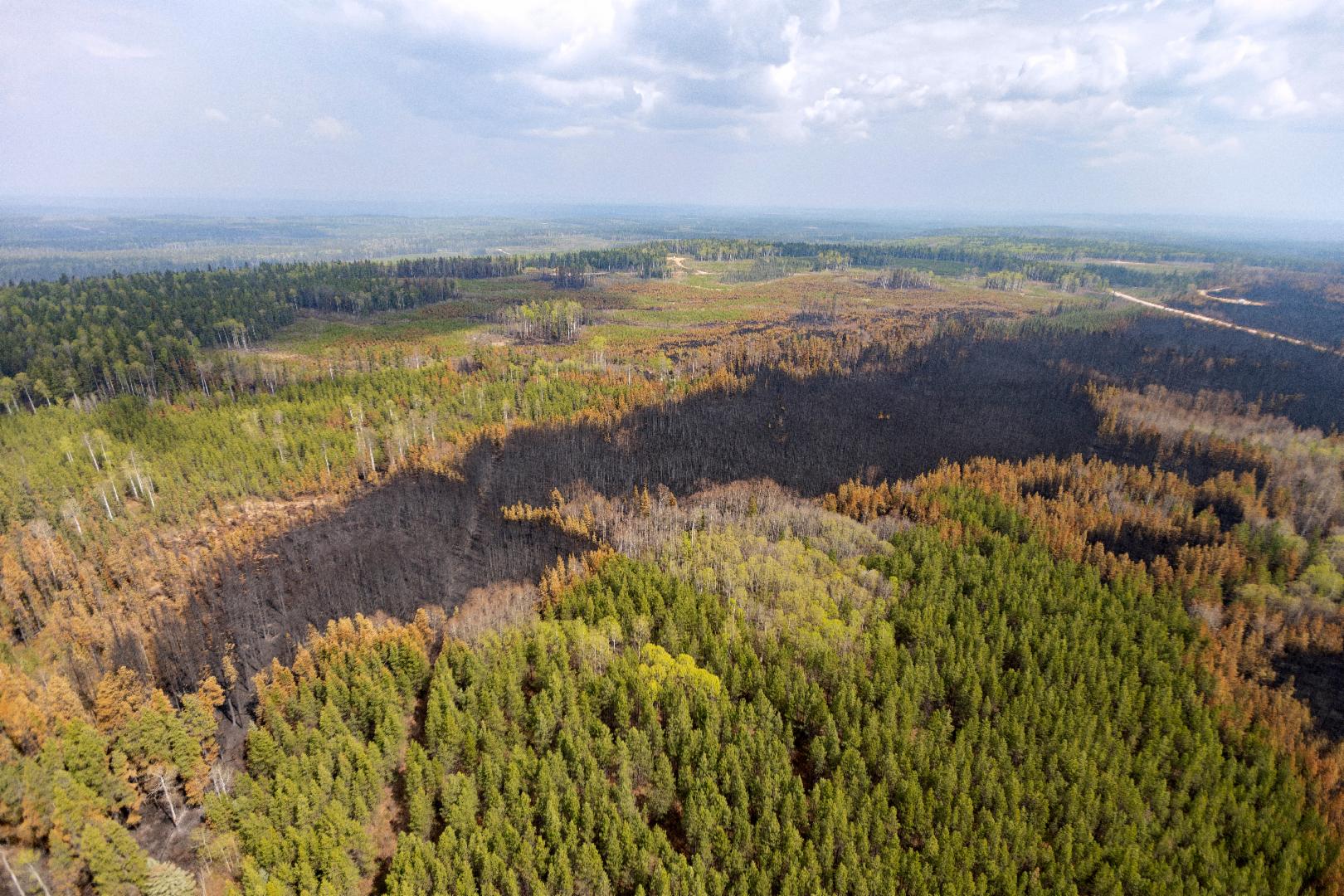
Alberta wildfire surge sparks unproven arson claims
- This article is more than two years old.
- Published on May 18, 2023 at 22:04
- 5 min read
- By Gwen Roley, AFP Canada
"It makes perfect sense -- start fires in all the conservative ridings, let those fires go out of control and then don't have a way for them to vote," says the speaker in a May 9, 2023 TikTok.
A similar claim spread on Facebook, expressing concern that displaced conservative voters would not be able to cast ballots in the May 29 provincial election. While other posts theorized arson was committed to create a political benefit for the New Democratic Party.
Other posts circulated on Instagram, Twitter, Facebook and TikTok, claiming the unprecedented number of wildfires in Alberta at the beginning of May were "suspicious," while a May 15 tweet claimed: "Looks like arson in Alberta."
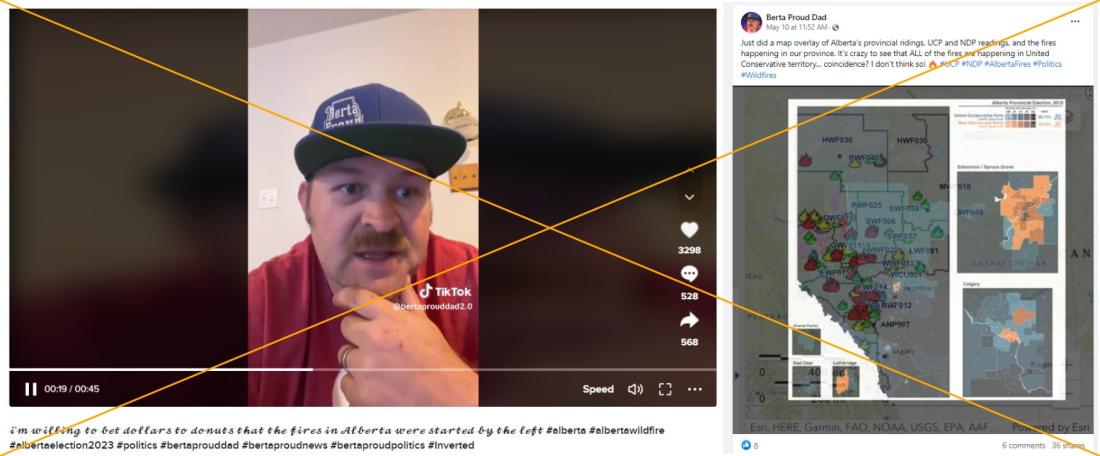
Melissa Story, a spokeswoman for Alberta Wildfire attributed the rapid spread and high number of fires to the current weather conditions.
"We've seen some hot, dry conditions here in the province, mixed with windy conditions," Story said. "So, fires can ignite very easily and spread quickly."
At least 25,000 people were evacuated after a state of emergency was declared on May 6.
Story said the origins of most of the recent wildfires are yet to be determined but are being investigated by Alberta Wildfire, sometimes with the help of the Forestry Crimes Unit of the Royal Canadian Mounted Police (RCMP).
Patrick Lambert, a spokesman for the Alberta division of the RCMP, said there are continuing investigations into the causes of ongoing wildfires in the province, but there was no indication of a concerted arson campaign.
"We have no evidence to support any kind of effort in that regard," Lambert said.
Human-caused
An article and some posters jumped on data from the Alberta Wildfire open data portal (archived here) which shows close to 90 percent of the wildfires listed as either "human-caused" or "under investigation."
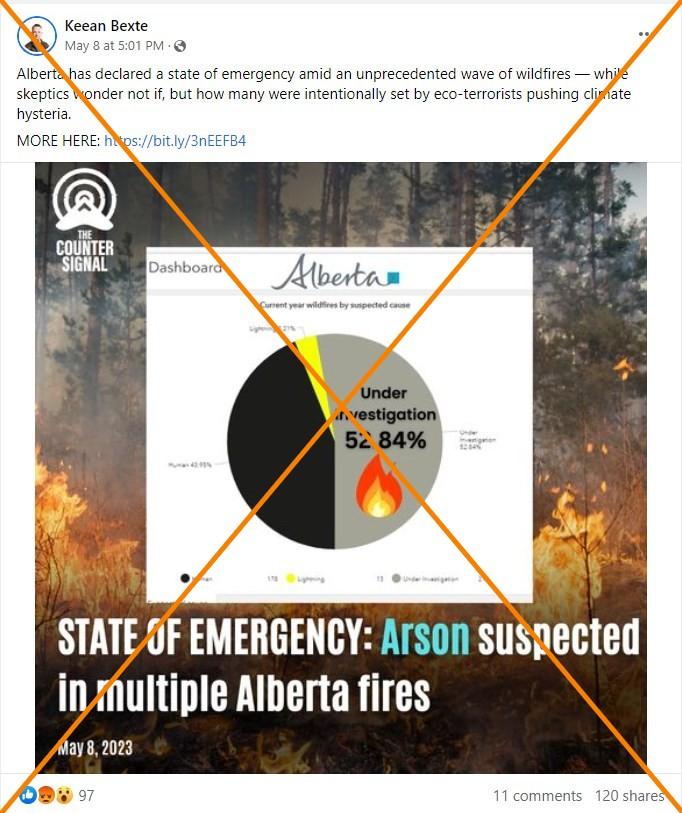
Story said that unless it can be determined that a wildfire was caused by lightning, those are the only categories available for classification prior to investigation. She also explained "human-caused" can mean many things other than arson.
"It could be related to general causes, including agriculture, forest industry, powerlines, or oil and gas industry, railroad or residential wildfires."
Other posts supported their claims of arson by sharing screenshots and links to articles about arsonists who had been charged and sentenced, but these were either published before 2023 or about crimes committed in previous years.
Story said the procedure for wildfire investigation begins within a month of a wildfire starting, but the official cause is not determined for at least 30 days.
According to Alberta Wildfire reports from previous years, 96 out of 1,246 wildfires in 2022 were found to be "incendiary" or intentionally started. In 2021, 151 out of 1,308 wildfires were reported in this category. So far this year, 487 fires have been recorded, a higher number than at this time in previous years.
Parkland County tweet
Users on Twitter and Facebook also spread their suspicions of arson in the ongoing wildfires by citing a May 3 post from the Parkland County Twitter account. It said the fire department had responded to four suspicious fires in the preceding five days on Highway 16, less than a 40-minute drive from the provincial capital of Edmonton.
Nancy Domijan, the Parkland County emergency incident commander for wildfire response, said in a May 16 email to AFP that these four fires which appeared to be set intentionally were separate from a larger wildfire which eventually caused an evacuation.
She said the tweet was meant to alert residents close to the site on Highway 16 while fire services were occupied fighting the wildfire.
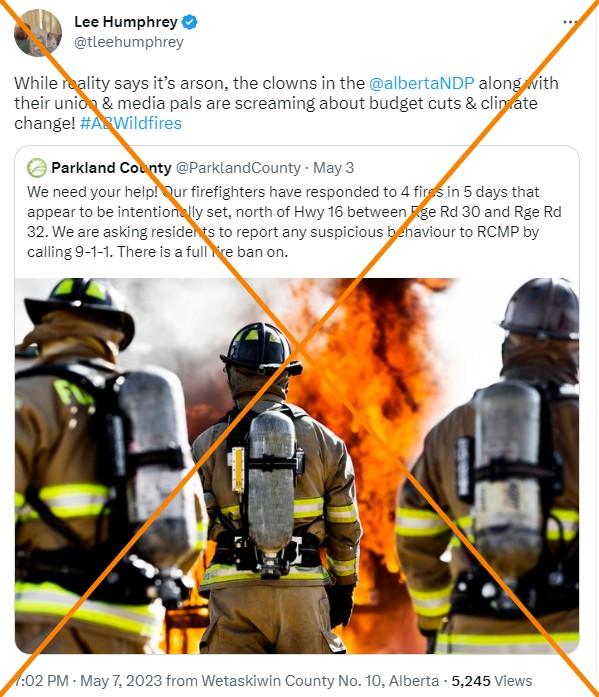
Domijan said the four suspicious fires and the larger wildfire in Parkland County were still under investigation and their origins had not yet been determined.
"Regarding the many wildfires that have been burning across Alberta this past month, though their origins may prove to stem from a variety of factors (pending investigation by fire investigators), it appears that their rapid growth is related to the hot, dry and windy conditions we’ve faced province-wide leading to extreme and dangerous fire conditions," she said.
Special ballots
Many posts cited fears the wildfires and evacuations would interfere with voting in the Alberta election. Users on Facebook encouraged people to not seek an advanced or special ballot until it became clear what the "fire scam" in Alberta would mean for the election.
Elections Alberta said electors displaced by emergency or disaster, including fires and floods, can vote by special ballot -- mail-in ballots that must be received by the close of election day on May 29.
Robyn Bell, a spokeswoman for Elections Alberta, said in a May 16 email to AFP that there would also be early in-person voting from May 23 to May 27, which will include a "Vote Anywhere Service" that allows voters to cast their ballot from any voting place in the province.
"Voting by special ballot or during advance voting are options that are available to all electors, regardless of whether they have been impacted or displaced by wildfires," she said.
Bell said the agency continues to monitor the wildfire situation in Alberta.
"As more information becomes available, we will determine if we need to deploy additional resources to any area of the province to accommodate voters who have been evacuated," she said.
Links to conspiracy
Additional posts invoked the 15-minute city conspiracy, saying the wildfire evacuees would be forced into towns with codified zones purportedly limiting their freedom of movement and restricting property ownership.
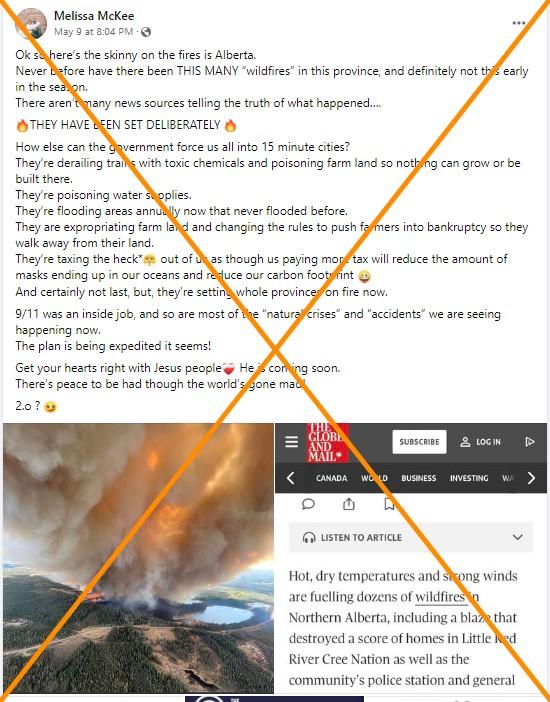
AFP has previously fact-checked claims about 15-minute cities and the concept does not impose movement or property restrictions. It is a city-planning framework meant to organize urban areas so all essential needs are within a short walk or bike ride from any resident's dwelling.
Others said the fires were started as a means to artificially generate panic around climate change.
Climate scientists have told AFP in the past that wildfires are getting more intense in areas where climate change is causing hotter, drier weather.
More of AFP's reporting on misinformation in Canada can be found here.
Copyright © AFP 2017-2026. Any commercial use of this content requires a subscription. Click here to find out more.
Is there content that you would like AFP to fact-check? Get in touch.
Contact us
